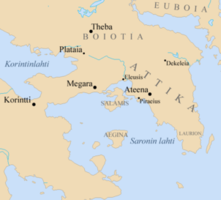en.wikipedia.org
- Was this helpful?
- The Megarian school of philosophy was founded by Euclides of Megara, who had been one of the pupils of Socrates in the late 5th century BC. [1] His successors, as head of the school in Megara, were said to have been Ichthyas (mid 4th century BC), and Stilpo (late 4th century BC). [2] It is unlikely, however, that the Megarian school was a genuine institution, but more of a casual description ...
britannica.com
Megarian school, school of philosophy founded in Greece at the beginning of the 4th century bc by Eucleides of Megara.It is noted more for its criticism of Aristotle and its influence upon Stoic logic than for any positive assertions. Although Eucleides was a pupil of Socrates and the author of Socratic dialogues, only imperfect glimpses of his thought survive.Author:The Editors of Encyclopaedia Britannicanewworldencyclopedia.org
New World Encyclopedia
https://www.newworldencyclopedia.org › entry › Megarian_school
The Megarian School of philosophy was founded c. 400 B.C.E. by Euclides of Megara, an early Hellenistic philosopher and one of the pupils of Socrates.Starting with the Socratic principle that virtue is knowledge, Euclides went on to define knowledge as a transcendental entity divorced from the sphere of sense and experience.The Megarians conducted their investigations by means of dialectic ...studylight.org
Megarian School of Philosophy ... None the less, in ancient times they received great respect owing to their intellectual pre-eminence. Cicero (Academics, ii. 42) describes their doctrine as a "nobilis disciplina," and identifies them closely with Parmenides and Zeno. But their most immediate influence was upon the Stoics, whose founder, Zeno ...hellenicaworld.com
The Megarian school of philosophy was founded by Euclides of Megara, one of the pupils of Socrates. Two main elements went to make up the Megarian as a doctrine. Like the Cynics and the Cyrenaics, Euclides started from the Socratic principle that virtue is knowledge.exploregreeceguide.com
exploregreeceguide.com
https://exploregreeceguide.com › megarian-school-of-philosophy
The Megarian School of Philosophy, an influential branch of ancient Greek philosophy, emerged during the 4th century BCE.vaia.com
Greek Megarian school - Key takeaways. The Greek Megarian school, founded by Eucleides of Megara, integrated Socratic ethics with Parmenidean monism, emphasizing that reality is singular and unchanging.; Key figures of the Greek Megarian school philosophy include Eucleides of Megara, Stilpo, Ichthyas, and Diodorus Cronus, known for their contributions to ethics, dialectics, and logic.theodora.com
ITA - Information Technology Associates
https://theodora.com › encyclopedia › m › megarian_school_of_philosophy.html
MEGARIAN SCHOOL OF PHILOSOPHY. This school was founded by Euclides of Megara, one of the pupils of Socrates. Two main elements went to make up the Megarian doctrine. Like the Cynics and the Cyrenaics, Euclides started from the Socratic principle that virtue is knowledge. But into combination with this' he brought the Eleatic doctrine of Unity.philosophy.institute
philosophy.institute
https://philosophy.institute › ancient-medieval › socratic-schools-legacy
Oct 21, 2023This section outlines the various philosophical schools that emerged from Socrates' teachings, including Cynicism, the Cyrenaic School, the Megarian School, and the Elian and Eretrian Schools. Each school's unique interpretation of Socratic philosophy is briefly discussed, showcasing the breadth of Socrates' influence on subsequent generations.oxfordre.com
Oxford Research Encyclopedia of Social Work
https://oxfordre.com › classics › display › 10.1093 › acrefore › 9780199381135.001.0001 › acrefore-9780199381135-e-4052
The Socratic school of philosophy founded by Euclides (1) of Megara in the early 4th cent. bce.Its last known head, Stilpon, died about a century later. Its preoccupations were ethical and metaphysical. The combined influence of Socrates and Parmenides is captured in its slogan 'The good is one thing, called by many names'. It taught the unity and invulnerability of virtue, reduced ...Can’t find what you’re looking for?
Help us improve DuckDuckGo searches with your feedback
